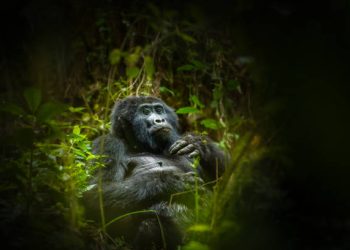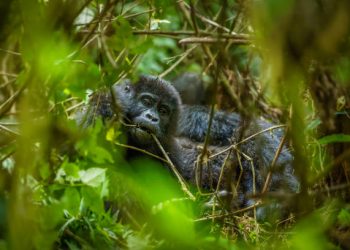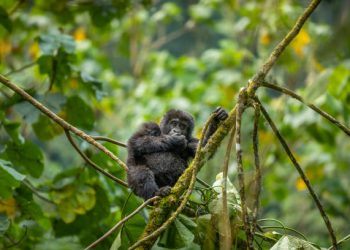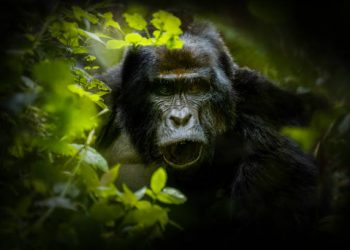Epic Guide to a Safe Gorilla Habituation Experience in Uganda
Gorilla Habituation Experience in Bwindi — A First-Timer’s Guide and Honest Reviews
Gorilla Habituation Experience in Bwindi Impenetrable Forest National Park Uganda. Discover what Gorilla Habituation is, How to book, prices, ethics, photography advice and why the four-hour experience is a once-in-a-lifetime wildlife experience.
The Gorilla Habituation Process (How the Gorillas Learn To Tolerate Human Presence)
Gorilla Habituation Experience is a gentle, science-driven process employed by primatologists and conservation groups to help wild primates become comfortable with the presence of people after a while.
Gorilla Habituation typically involves:
- Daily observation by rangers and researchers from a safe distance.
- Gradual reduction of distance as the group becomes more comfortable with nearby humans.
- Behavioural monitoring to ensure no stress or harmful changes arise.
- Slow introduction of longer visits and ultimately, controlled tourist encounters.
For the mountain gorillas, it typically takes two to five years for the group to accustom itself to people in order to become visitor-ready. It can take far longer with other primates such as chimpanzees. The objective always remains the same: permit research and ecotourism while maintaining the health and safety of the animals.
Why Gorilla Habituation Experience instead of Trekking?
- More time: Four hours instead of one hour — more opportunity to see natural behavior.
- Guiding the experience and offering information regarding science, culture, and conservation are commonly offered by researchers and trackers.
- Rarely: Not more than five habituation permits are issued per day, so this actually is a very rare experience.
Acquiring your Gorilla Habituation Permit
The Uganda Wildlife Authority (UWA) controls the habituation permits tightly. Not very many exist, and everybody needs them. If you desire this Gorilla Habituation Experience, be sure to book some months in advance.
For convenience, most travelers opt for Mpenzi Safaris Africa, a trustworthy operator. For assistance with permits, itinerary, accommodation, and transfers, Mpenzi Safaris Africa does all the arrangements — Text to+256 777836554 or message to get started with the planning.
Note: Habituated does not mean tame. Gorillas keep their wildness; sometimes they show signs or pretend to charge to remind visitors to act respectfully.
The Bwindi Impenetrable Forest’s Gorilla Habituation Experience is the superior, less crowded alternative to standard gorilla trekking. In lieu of a short 60-minute meeting, you can spend three up to a maximum of four hours with a semi-habituated gorilla family — a unique opportunity to observe their behavior and interpersonal dynamics at close range in their jungle environment.
Gorilla Habituation Experience is not a zoo visit. It is wildlife in its natural, delicate beauty: gentle cleaning, young gorillas playing, and the calm presence of a silverback. Because getting used to people takes time, the families you can see during this experience are somewhat familiar with humans after months (or years) of careful, expert effort.
Two of the existing groups utilized for habituation are the Bikyingi group in Rushaga and the Posho family in Nkuringo. The groups are in multi-year programs to gradually accept the presence of humans without losing their wild instincts.
Gorilla Trekking Vs Gorilla Habituation Experience
Gorilla Trekking and Gorilla habituation both promise unforgettable encounters with mountain gorillas, but they deliver very different experiences. Gorilla Trekking in Uganda is the more common option: a guided hike into the forest to find a fully habituated family for a one-hour visit. It’s intense, emotional and often unpredictable — you might track a group for a short walk or a full-day hike depending on where they are. Trekking is accessible to more visitors and is usually less expensive, making it ideal for travelers who want the thrill of seeing Gorillas in the Wild without a huge time or budget commitment.
Gorilla Habituation, by contrast, is designed for depth and research. You spend several hours (commonly up to four) with a semi-habituated group that is being slowly acclimated to human presence. This option gives more time to observe social behavior, interact with trackers and learn about conservation work. Habituation permits are far rarer, pricier, and come with stricter rules because the gorillas are still adjusting and more vulnerable. In short: choose trekking for a powerful, shorter encounter; choose habituation for an extended, intimate, and conservation-focused experience.
| Feature | Gorilla Trekking | Gorilla Habituation |
|---|---|---|
| Typical visit length | Approximately 1 hour | Up to 4 hours |
| Permit availability | More common | Very limited |
| Cost (general) | Lower | Higher |
| Close-up time | Shorter | Longer |
| Best for | First-time visitors, tighter budgets | Photographers, researchers, experienced nature-lovers |
| Conservation impact | Lower direct research value | Higher research & monitoring value |
| Ethical sensitivity | Lower risk (fully habituated groups) | Higher risk — stricter rules |
| Physical demand | Varies, can be strenuous | Often strenuous (longer time in forest) |
| Photo opportunities | Good but brief | Excellent — more time to compose shots |
Gorilla Habituation Experience Useful Suggestions
- Physical fitness: Trails are likely very steep and muddy. Hike in preparation.
- Health regulations: Ill visitors are not permitted because the gorillas are subject to catching human illnesses.
- Distance: Keep at least 7–10 meters from the animals at all times unless the guides instruct otherwise.
- Behaviour: Walk slowly, talk softly, and always listen to the guidelines from your guide.
- What to bring: Rain-wearing clothes, sturdy shoes, bug spray, light backpack, snacks, and a good attitude.
Cost and Availability
The habituation permit is a one-of-a-kind experience. Today, the price for a permit is USD 1,500 per person. Uganda Wildlife Authority only awards a very few habituation permits per day (usually eight), so plan ahead — booking with us earlier will get you organized and secure your spot.
Today, the Rushaga have habituation groups like Bikyingi and Posho (Nkuringo), but the access varies with the groups in their stages of habituation. Write to us today for up-to-date availability.
The Moral Argument: Conservation versus Risk
Gorilla Habituation is in dispute. Critics believe that repeated contact with humans:
- Intercepts normal activities,
- Increases disease transmission threat,
- May cause poaching susceptibility.
They argue in turn that habituation was key to successful long-term conservation by:
- Increasing worldwide recognition and funds,
- Helping local communities make a living,
- Assisting scientific research which informs conservation activities.
UWA and conservation personnel reduce risks with stringent visitor regulations, health screening, and watchful observation. The ethical concern with balancing scientific, economic, and conservation benefits and the health and well-being of animals — with which all prudent operators and researchers take very seriously.
Gorilla Habituation Experience Photography Tips
Four hours in the forest goes a long way in helping the photographer, but still you must be prepared:
- Pack extra batteries and memory cards.
- The 70–200mm zoom is perfect for distancing with respect.
- A fast 2.8 lens helps in low-light forest conditions.
- Incorporate a waterproof camera cover and turn off the flash — flash use is prohibited.
Take your time: watch carefully as much as you take pictures. The best photos often come when you are paying attention








The Perfect 3-Day Gorilla Habituation Experience in Bwindi
Spend the 3-Day Gorilla Habituation Experience entering the hush of Bwindi to watch researchers gently introduce wild gorillas to human presence. This 3-Day Gorilla Habituation Experience mini-safari centers on a rare, four-hour habituation visit in the Rushaga sector — far deeper than a standard one-hour trek. You’ll travel by 4×4 from Kampala, pause at the Equator for photos, break for lunch in Mbarara, then settle into a nearby lodge the first night.
Day two of the 3-Day Gorilla Habituation Experience starts with morning briefing at Rushaga headquarters, then the four-hour habituation session with trackers and rangers that describe gorilla habits and conservation activities. Day three sees you back in Kampala after lunch in Mbarara. The 3-Day Gorilla Habituation Experience is personal, informative and well managed — there are limited permits and these are incorporated into the cost of a tour — this is a sensible way to fund the conservation of gorillas while experiencing natural behaviour on an extended stay.
Summary of 3-Day Gorilla Habituation Experience Itinerary
- Day 1: Early pick-up in Kampala → Equator photo stop → lunch in Mbarara → drive to Bwindi → check-in at lodge.
- Day 2: Transfer to Rushaga HQ → briefing → 4 hours gorilla habituation with rangers → return to lodge.
- Day 3: Early breakfast → drive back to Kampala with lunch in Mbarara → drop-off at your hotel/home.
Detailed 3-Day Gorilla Habituation Experience
| Day | Main activities | Meals | Accommodation (examples) |
|---|---|---|---|
| Day 1 | Pickup in Kampala → Drive south → Equator stop (~30 mins) → Lunch in Mbarara → Arrive Bwindi, check in | Lunch, Dinner | Four Gorillas Lodge, Gorilla Leisure Lodge, Ichumbi Gorilla Lodge |
| Day 2 | Early drive to Rushaga sector HQ → Briefing on dos/don’ts → 4 hours gorilla habituation with rangers → Return to lodge | Breakfast, Packed Lunch, Dinner | Same as Day 1 |
| Day 3 | Breakfast → Drive back to Kampala → Lunch in Mbarara → Drop off at hotel/place of residence | Breakfast, Lunch | End of 3-Day Gorilla Habituation Experience |
Ultimate 5-Day Chimpanzee and Gorilla Habituation Experience
This 5-Day Chimpanzee & Gorilla Habituation Safari combines two amazing primate experiences in Uganda: A four-hour gorilla habituation in Bwindi and a full day of chimpanzee habituation in Kibale. The 5-Day Chimpanzee & Gorilla Habituation Safari trip starts with pickup in Kampala or Entebbe and a long scenic drive to southern Bwindi, passing the Equator and Kigezi hills.
Day 2 of the 5-Day Chimpanzee & Gorilla Habituation Safari is the best part — a carefully supervised, four-hour session with researchers and rangers who are slowly introducing gorillas to people. After a relaxed transfer to Kibale, you will join primatologists for a day-long chimp habituation trek in one of Africa’s richest primate communities.
The 5-Day Chimpanzee & Gorilla Habituation Safari Tour is designed for small groups (maximum six), includes accommodation and most meals, and requires participants to be at least 15 years old for habituation activities. It’s perfect for travelers who want closer wildlife encounters, conservation insights, and more chances for photos — all arranged with trained guides and 4×4 Safari Transfers.
Summary of 5-Day Chimpanzee & Gorilla Habituation Safari
- Day 1: Pickup in Kampala or Entebbe, drive south toward Bwindi (scenic stops en route).
- Day 2: Gorilla habituation in Rushaga — 4 hours in the forest with researchers and rangers.
- Day 3: Drive from Bwindi to Kibale Forest (travel day with lunch en route).
- Day 4: Full-day chimpanzee habituation experience in Kibale with guides and researchers.
- Day 5: Return drive to Entebbe/Kampala (transfer to airport or hotel).
Detailed 5-Day Chimpanzee & Gorilla Habituation Safari
| Day | Main activities | Drive time (approx) | Meals | Accommodation (examples) |
|---|---|---|---|---|
| Day 1 | Pickup in Kampala/Entebbe → Scenic drive (Equator stop, Kigezi hills) → Arrive Bwindi, check-in | 9–10 hours | Lunch, Dinner | Local Bwindi lodges (near Rushaga) |
| Day 2 | Briefing at park HQ → 4-hour gorilla habituation with rangers/researchers → Return to lodge | Short transfer to trailhead | Breakfast, Packed Lunch, Dinner | Same Bwindi lodge |
| Day 3 | Drive from Bwindi to Kibale Forest National Park → Check-in and relax | 6–7 hours | Breakfast, Lunch, Dinner | Comfort lodges near Kibale |
| Day 4 | Briefing in Kibale → Full-day chimpanzee habituation with guides & researchers → Return to lodge | Short transfer to trailhead | Breakfast, Packed Lunch, Dinner | Same Kibale lodge |
| Day 5 | Breakfast → Drive back to Entebbe/Kampala → Drop-off at airport or hotel | 5–6 hours | Breakfast, Lunch | End of 5-Day Chimpanzee & Gorilla Habituation Safari |







